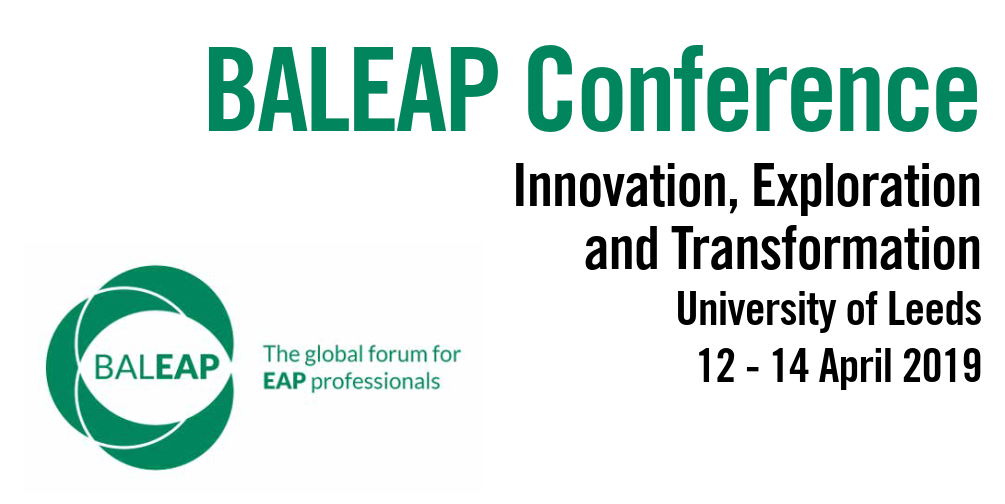Friday 12 April – Session 1 14:45 – 16:15
Scholarship/Research/CPD 1 – Michael Sadler Building LG.10
What makes writing academic
https://baleap2019.co.uk/wp-content/uploads/2019/03/BALEAP-Programme.pdf
https://www.baleap.org/event/baleap-2019-leeds
Molinari, Julia
University of Nottingham
Abstract for publication
In this talk, I argue that what makes writing academic are the academic values and practices that it enacts and not its surface features, structural moves or lexical repertoires, as many popular EAP text books foreground (Sowton, 2016). I do this by shifting the focus from writing as a skills-based activity that adheres to prescribed conventions, to writing as a social practice (Paxton, 2013), which requires an account of how writers (understood as agents) enact choices as they interact with their textual
environments (understood as structures) to communicate their knowledge (Archer, 2000; Scott, 2000). In doing so, I propose a conceptualisation of writing that draws on debates in the philosophy of mind, sociology and critical realism (Sawyer, 2001) to claim that academic content can emerge from the forms that shape it without being reduced to or determined by these forms (Ablowitz, 1939). This allows me to conclude that academic writing is an open system that is realised by multiple forms (Collier, 1994; Fodor, 1974) and that it is capable of being novel. Possible implications of such a conclusion are that academic writings can be multimodal and multilingual, a conclusion that departs from the mainstream EAP writing canon.
This matters to the teaching and learning of EAP writing for at least the following reasons:
– Academic writing landscapes are varied because academic agents and structures are varied
– Popular EAP textbooks privilege selected understandings of what makes writing academic at the expense of others
– If we adhere to the view that EAP has an educative role (Widdowson, 1983), then writing as an open system may facilitate the enactment of such a role
– When EAP is framed as a field of study rather than as a service industry (Ding & Bruce,
2017), what we understand by ‘academic writing’ becomes shaped by writing scholarship
and research, not textbooks
– An approach to writing that is mindful of academic practices and values may foster deeper dialogue between teachers and students, allow us to re-think assessment systems, and curtail the need for ghostwriters
My talk will exemplify academic writings from a range of disciplines that depart from the mainstream canon of what makes writing academic to explain what academic practices and values emerge. It will be interactive throughout because I intend to posit questions for the audience to reflect on and then weave these reflections into the talk itself.
References
Ablowitz, R. (1939). The Theory of Emergence. Philosophy of Science, 6(1), 1-16.
Archer, M. S. (2000). Being human : the problem of agency. New York: Cambridge University Press.
Collier, A. (1994). Critical realism: an introduction to Roy Bhaskar’s philosophy. London: Verso.
Ding, A., & Bruce, I. (2017). The English for Academic Purposes Practitioner: Operating on the Edge of Academia. In P. Macmillan (Ed.).
Fodor, J. (1974). Special Sciences (Or: The Disunity of Science as a Working Hypothesis). Synthese, 28(2), 97-115.
Paxton, M. (2013). Genre: A Pigeonhole or a Pigeon? Case Studies of the Dilemmas Posed by the Writing of Academic Research Proposals. In L. Thesen & L. Cooper (Eds.), Risk in academic writing : postgraduate students, their teachers and the making of knowledge (pp. 148-165). Bristol: Multilingual Matters.
Sawyer, R. K. (2001). Emergence in Sociology: Contemporary Philosophy of Mind and Some Implications for Sociological Theory. American Journal of Sociology, 107(3), 551-585.
Scott, M. (2000). Agency and Subjectivity in Student Writing. In C. T. J. S. B. Jones (Ed.), Students Writing in the University. Philadelphia: John Benjamins Publishing Company.
Sowton, C. (2016). Contemporary Academic Writing: a comprehensive course for students in Higher Education. Reading: Garnet Publishing Ltd.
Widdowson, H. G. (1983). Learning purpose and language use. Oxford: O U P.
